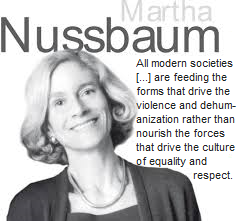
Arquivo para January 6th, 2015
Martha Nussbaum and the fragile well
 In the interval of time that separates the publication of the book “The Republic of Plato: the good society and the desire deformation” in 1986 and the translation into Portuguese in Porto Alegre, Bestiario editor (2004), there was the public recognition the contemporary philosopher Martha Nussbaum, especially in the Anglo-Saxon world.
In the interval of time that separates the publication of the book “The Republic of Plato: the good society and the desire deformation” in 1986 and the translation into Portuguese in Porto Alegre, Bestiario editor (2004), there was the public recognition the contemporary philosopher Martha Nussbaum, especially in the Anglo-Saxon world.
Martha is a scholar of classical antiquity thought and said in an interview: “All modern societies […] are feeding the forms that drive the violence and dehumanization rather than nourish the forces that drive the culture of equality and respect” .
In his book the fragility of the good (or goodness, reflect some) dialogues with the “moral fortune” (moral luck) introduced in the Anglo-Saxon thought by Bernard Williams and whose main target ethical conceptions derived from Kant.
.
As observed by the very Nussbaum, “goodness” of the title should be understood as “human well” to eudaimonia, and not as “goodness of character,” so trasnlate as “well”.
Williams’ critique of the self-sufficiency of Kantian ethics brings with it the possibility to point to a certain dualism present in this design where the should be and be the ideal and real translate into two poles: a purely subjective, the intention of the agent and normative guidance the will and the other, the objective element, the affection of the act and its discover in reality.
.
Martha Nussbaum, in taking the category of “moral fortune” changes the focus for Williams, instead of reflective consciousness of the moral subject, turning his attention, not exclusive to impasses goals resulting from the tension between the pursuit of well-moral life successful and the contingencies of his achievement, overcoming dualism.
The three issues presented in the book are opening: the Aristotelian method: approaches of human things, creating a certain phenomenological ethics (), as an inseparable part of a good life: love, friendship, political activity etc, so things taken how valuable are plural, and thirdly the emoções, desires, feelings in binding to objects, by definition, private and contingents, exposing us to the precariousness and the constitutive these indeterminacy.
Although philosopher, Martha is practical and wants to penetrate in everyday moral, and writes, “motivated by a keen sense of the problems caused in human life by fortune out of control” (Nussbaum, 2010, p 80.).
Martha discussed in chapter 4 the notion of tuch in relation to the concept of techn (expertise, science) based on the ideas conceived in the fifth and fourth centuries BC as a form of control over the tuch, it would be interesting but does not, the relationship with techné, but I see some problems in the Brazilian translation.
Thus the author to propose a rereading of the Aristotelian ethics linked to the world of the tragedy to be anthropocentric, is compelled to take the fortune as constitutia condition of life, and it has an impact on the condition the understanding of the role of practical rationality.
For her the limits of the discourse of moral philosophy are given by human limits “its matter is the human good, or the good life for human beings,” this well exposed to fortune and chance, is fragile.

